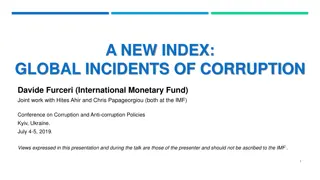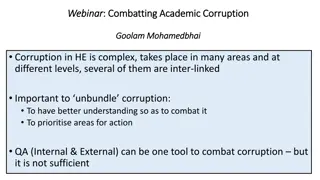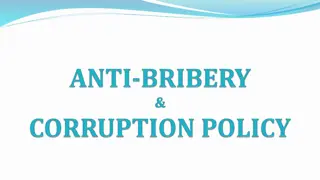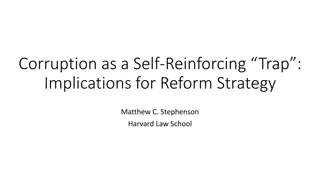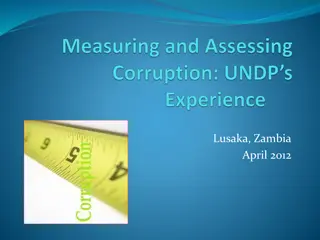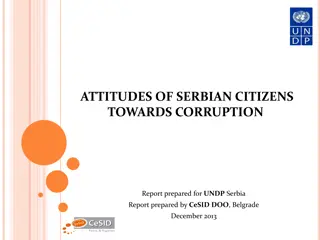European Anti-Corruption Report - National Chapters Recommendations
The European Anti-Corruption Report addresses corruption issues in Austria, Belgium, Bulgaria, Croatia, and Denmark. Recommendations include improving transparency, implementing ethical rules, developing codes of conduct, and enhancing mechanisms to prevent corruption.
Download Presentation

Please find below an Image/Link to download the presentation.
The content on the website is provided AS IS for your information and personal use only. It may not be sold, licensed, or shared on other websites without obtaining consent from the author.If you encounter any issues during the download, it is possible that the publisher has removed the file from their server.
You are allowed to download the files provided on this website for personal or commercial use, subject to the condition that they are used lawfully. All files are the property of their respective owners.
The content on the website is provided AS IS for your information and personal use only. It may not be sold, licensed, or shared on other websites without obtaining consent from the author.
E N D
Presentation Transcript
The European Anti-Corruption Report The National Chapters
Austria Making access to bank information easier, in cases of suspicion of corruption, prosecution of bribery more effective would make the The Commission suggests that Austria introduces a monitoring mechanism for checking declarations of assets for elected and appointed senior officials Opinion polls show that Austria is the only Country in Western Europe where a relatively large proportion of respondents would find it acceptable to do a favour or give a gift in exchange for a public service
Belgium The European Commission suggests that ethical rules are implemented elected officials at federal, regional and local levels for all appointed and Belgium should increase the capacity of the justice system and law enforcement to make sure that corruption cases are prosecuted before their time limits run out
Bulgaria Corruption remains widespread Bulgaria should shield anti-corruption institutions from political influence management in a procedure and appoint merit-based their transparent, The Commission suggests that a Code of Ethics is adopted for members of the National Assembly, and that dissuasive sanctions for corruption in public procurement are enforced at national and local level
Croatia There appears to be more emphasis on repression of corruption as opposed to prevention Croatia should develop codes of conduct for elected officials at central and local levels with adequate accountability tools, carry out substantial check of assets declarations and conflicts of interest of public officials, and establish an effective mechanism for prevention of corruption in state-owned companies. The Commission suggests that Croatia implements a strategy for preventing procurement, including with regard to the healthcare sector, and ensure protection whistleblowers who report corruption and state controlled corruption in public mechanisms for
Denmark Denmark is among the top EU performers in terms of transparency, integrity and control of corruption The improve mechanisms of the financing of political parties and individual candidates European Commission transparency suggests and to supervisory further the The Commission suggests that further efforts undertaken to fight foreign bribery, by, for example, raising the level of fines for corporations are
France conduct France assessment to identify risks at local level, and set priorities for anti-corruption measures related to public procurement should a comprehensive The Commission suggests that France improves the legislation on foreign bribery, and makes efforts to increase the operational prosecutors. independence of
Germany When it comes to fighting corruption, Germany is among the best countries of the EU. However, more can be done. In this Commission points out that Germany would benefit from the introduction corruption of elected officials. The Commission also suggests that Germany should develop a policy to deal with the revolving door phenomenon, where officials leave office to work for companies they may have recently helped. report, The European of strict penalties for
Italy The adoption of the anti-corruption law in November 2012 represents a significant step forward in the fight against corruption in Italy. However, despite considerable efforts, corruption remains a serious challenge in Italy The commission suggests that Italy should strengthen the integrity regime for elected officials through ethical codes, including accountability tools Italy should also reinforce the legal and institutional framework on party funding. Furthermore, the deficiencies of the statute of limitation regime should be addressed without delay. The Commission also suggests that Italy reinforces the powers and capacity of the National Anti-Corruption Agency to perform a strong coordination role, enhances transparency around the public procurement and takes further steps to address shortcomings regarding corruption in the private sector
Spain Particularly challenging is political corruption and deficient checks and balances, notably in public spending and control mechanisms at regional and local levels. The European Commission suggests that tailor- made anti-corruption strategies for regional and local levels administrations are developed, that on- going reforms and implementation of the new rules on party funding is comprehensive codes of conduct for elected officials with adequate accountability tools are developed pursued, and that
Sweden Sweden is among the least corrupted countries in the EU. It has taken an ambitious role in fighting corruption, and several anti-corruption initiatives have been carried out. However: The Commission suggests that municipalities and county councils should transparency in public entrepreneurs The Commission also suggests that the level of fines for committing foreign bribery should be raised, and that liability should be triggered even if the crime has been committed by intermediaries or third- party agents be contracts obliged to secure private with
United Kingdom Traditionally the UK promotes high ethical standards of public service. However, to ensure continued success, further efforts are necessary to address risks of foreign bribery in vulnerable industries such as defence The European Commission suggests that the UK should ensure transparency settlements in corruption cases. Accountability in the governance of banks can also be further strengthened in out-of court
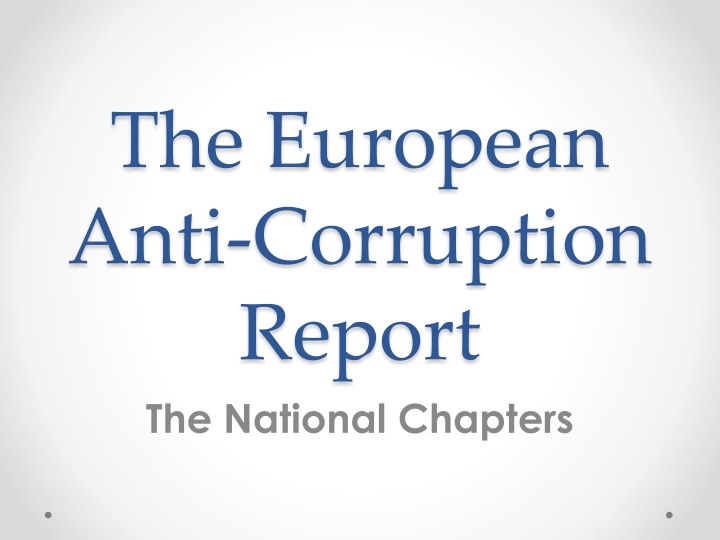



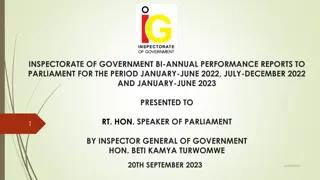


![Comprehensive Overview of Corruption Watch Submission on Public Procurement Bill [B18B-2023]](/thumb/138344/comprehensive-overview-of-corruption-watch-submission-on-public-procurement-bill-b18b-2023.jpg)



